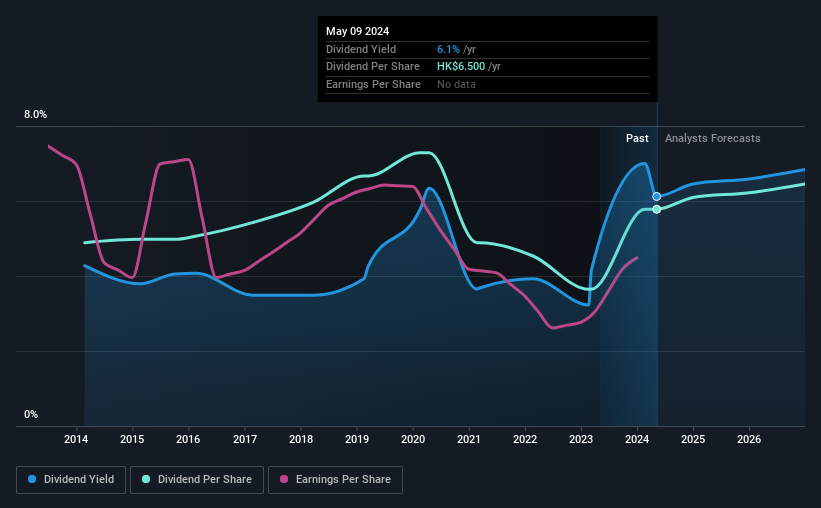Why It Might Not Make Sense To Buy Hang Seng Bank Limited (HKG:11) For Its Upcoming Dividend

Readers hoping to buy Hang Seng Bank Limited (HKG:11) for its dividend will need to make their move shortly, as the stock is about to trade ex-dividend. The ex-dividend date occurs one day before the record date which is the day on which shareholders need to be on the company's books in order to receive a dividend. The ex-dividend date is important because any transaction on a stock needs to have been settled before the record date in order to be eligible for a dividend. Therefore, if you purchase Hang Seng Bank's shares on or after the 14th of May, you won't be eligible to receive the dividend, when it is paid on the 6th of June.
The company's next dividend payment will be HK$1.20 per share, on the back of last year when the company paid a total of HK$6.50 to shareholders. Calculating the last year's worth of payments shows that Hang Seng Bank has a trailing yield of 6.1% on the current share price of HK$106.20. If you buy this business for its dividend, you should have an idea of whether Hang Seng Bank's dividend is reliable and sustainable. That's why we should always check whether the dividend payments appear sustainable, and if the company is growing.
Check out our latest analysis for Hang Seng Bank
Dividends are usually paid out of company profits, so if a company pays out more than it earned then its dividend is usually at greater risk of being cut. Hang Seng Bank paid out 73% of its earnings to investors last year, a normal payout level for most businesses.
When a company paid out less in dividends than it earned in profit, this generally suggests its dividend is affordable. The lower the % of its profit that it pays out, the greater the margin of safety for the dividend if the business enters a downturn.
Click here to see the company's payout ratio, plus analyst estimates of its future dividends.

Have Earnings And Dividends Been Growing?
Businesses with shrinking earnings are tricky from a dividend perspective. If earnings fall far enough, the company could be forced to cut its dividend. Hang Seng Bank's earnings per share have fallen at approximately 6.3% a year over the previous five years. When earnings per share fall, the maximum amount of dividends that can be paid also falls.
Many investors will assess a company's dividend performance by evaluating how much the dividend payments have changed over time. Since the start of our data, 10 years ago, Hang Seng Bank has lifted its dividend by approximately 1.7% a year on average.
The Bottom Line
Has Hang Seng Bank got what it takes to maintain its dividend payments? Earnings per share have been declining and the company is paying out more than half its profits to shareholders; not an enticing combination. This is not an overtly appealing combination of characteristics, and we're just not that interested in this company's dividend.
With that being said, if you're still considering Hang Seng Bank as an investment, you'll find it beneficial to know what risks this stock is facing. Case in point: We've spotted 1 warning sign for Hang Seng Bank you should be aware of.
Generally, we wouldn't recommend just buying the first dividend stock you see. Here's a curated list of interesting stocks that are strong dividend payers.
Valuation is complex, but we're here to simplify it.
Discover if Hang Seng Bank might be undervalued or overvalued with our detailed analysis, featuring fair value estimates, potential risks, dividends, insider trades, and its financial condition.
Access Free AnalysisHave feedback on this article? Concerned about the content? Get in touch with us directly. Alternatively, email editorial-team (at) simplywallst.com.
This article by Simply Wall St is general in nature. We provide commentary based on historical data and analyst forecasts only using an unbiased methodology and our articles are not intended to be financial advice. It does not constitute a recommendation to buy or sell any stock, and does not take account of your objectives, or your financial situation. We aim to bring you long-term focused analysis driven by fundamental data. Note that our analysis may not factor in the latest price-sensitive company announcements or qualitative material. Simply Wall St has no position in any stocks mentioned.
About SEHK:11
Hang Seng Bank
Provides various banking and related financial services to individual, corporate, commercial, small and medium-sized enterprises, and institutional customers in Hong Kong, the Mainland of China, and internationally.
Proven track record with adequate balance sheet and pays a dividend.

